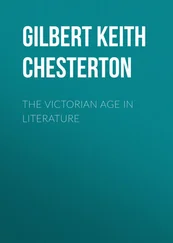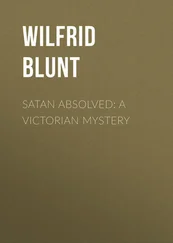Michael Kurland - Victorian Villainy
Здесь есть возможность читать онлайн «Michael Kurland - Victorian Villainy» весь текст электронной книги совершенно бесплатно (целиком полную версию без сокращений). В некоторых случаях можно слушать аудио, скачать через торрент в формате fb2 и присутствует краткое содержание. Жанр: Классический детектив, на английском языке. Описание произведения, (предисловие) а так же отзывы посетителей доступны на портале библиотеки ЛибКат.
- Название:Victorian Villainy
- Автор:
- Жанр:
- Год:неизвестен
- ISBN:нет данных
- Рейтинг книги:5 / 5. Голосов: 1
-
Избранное:Добавить в избранное
- Отзывы:
-
Ваша оценка:
- 100
- 1
- 2
- 3
- 4
- 5
Victorian Villainy: краткое содержание, описание и аннотация
Предлагаем к чтению аннотацию, описание, краткое содержание или предисловие (зависит от того, что написал сам автор книги «Victorian Villainy»). Если вы не нашли необходимую информацию о книге — напишите в комментариях, мы постараемся отыскать её.
Victorian Villainy — читать онлайн бесплатно полную книгу (весь текст) целиком
Ниже представлен текст книги, разбитый по страницам. Система сохранения места последней прочитанной страницы, позволяет с удобством читать онлайн бесплатно книгу «Victorian Villainy», без необходимости каждый раз заново искать на чём Вы остановились. Поставьте закладку, и сможете в любой момент перейти на страницу, на которой закончили чтение.
Интервал:
Закладка:
Moriarty leaned forward, his eyes bright. “It is, after all, my profession, my lord,” he said. “My ability to see what others cannot is, presumably, what brought you to me. Now, what is your problem?”
Lord Tams took a deep breath, or perhaps it was a sigh. “Your surmises are correct, Professor Moriarty,” he said. “I am unmarried. My profession, if such I may call it, has been writing free-lance articles on economic subjects for various London newspapers and magazines. When an editor wants a piece on free trade, or Servian war reparations, he calls on me. I have recently-very recently-come into the title, inheriting it from my elder brother Vincent, who died suddenly. It is his death that has brought me here to seek your assistance.”
I leaned forward in my chair. The thrill of being in at the beginning of one of Moriarty’s little exercises does not diminish with time. “Your brother was murdered?” I asked.
“My brother’s death was, and is, completely unexplainable, Mr. Barnett,” Lord Tams replied.
Moriarty clapped his hands together. “Really?” he said. “Come, this is quite-interesting. Tell me everything you know of the affair.”
“The circumstances are simple. Vincent had gone to one of his clubs-the Paradol in Montague Street-to stay for a few days. On the morning of the third day a waiter went in to bring Vincent his breakfast, which he had ordered the night before, and found my brother dead in his bed. He was lying on his back, his face and chest unnaturally red, his hands were raised as if to ward off some unseen threat, and a look of terror was fixed on his face. The club doctor, a Dr. Papoli, examined him and said it was apoplexy; but, as the doctor is from somewhere in the Balkans, and lacks a British medical degree, nobody seemed to take him too seriously. The police doctor strongly disagreed, although he could not come up with an alternate diagnosis. ”
“This was at the Paradol, you say? Did your brother commonly frequent the Paradol Club?”
“He has been a member for years,” his lordship said, “going perhaps six or seven times a year. But for the past three months he had been going twice a month, and staying for two or three days each time.”
“Are you also a member?”
“I am a permanent guest of my brother’s,” his lordship said. “I occasionally use the reading room, but as for the club’s other-functions-I found that they were not to my taste.”
“I don’t believe I know the club,” I said to Moriarty.
“It is for, ah, specialized interests,” Moriarty told me. “It is where rich men go to meet with complaisant women. It is an upper-class rendezvous for what the French call le demi-monde. The French seem to have a word for everything, have you noticed?”
“It is so,” Lord Tams agreed. “The Paradol Club exists for those gentlemen who enjoy the company of women of, let us say, loose morals but impeccable manners. It is not the only establishment of its type in London, but it is one of the most exclusive, expensive, and discreet.”
“Did your brother express his taste for these sorts of amusements in any other way?” Moriarty asked.
“His whole life revolved around the pleasures of the senses. It’s funny, really; Mama was always pleased that Vincent didn’t go in for blood sports. She never guessed the sort of sport in which he did indulge.”
Moriarty leaned back in his chair and fixed his gaze on Lord Tams. “When was the last time you saw your brother?” he asked.
“The evening before he died.”
“Ah! Under what circumstances?”
“I went to see him at the club to ask a favor of him. I am-I was-getting married. I wanted to advance some money from my allowance.”
“Allowance?” Moriarty asked. “Then you had nothing on your own?”
“Upon our father’s death the entire estate went to Vincent. The house and lands were, of course, entailed, but Vincent also inherited everything else. It was inadvertent. Vincent was fourteen years older than I, and the will was drawn two years before I was born. My parents did not expect another child, and no provision was made in the will for the unexpected. My father died suddenly shortly before my second birthday, and had not gotten around to revising the will.”
“I see,” Moriarty said.
“My brother has actually been quite generous,” Lord Tams said. “The income of a free-lance journalist is precarious at best. Vincent gave me an allowance and added a few odd bob here and there when needed.”
“How did you feel about his-indulgences?”
“It was not my place to approve or disapprove. Vincent’s penchants were his own business. His habits, as he kept reminding me, hurt no one. His view was that his companions were all willing, and profited from the relationship. I remonstrated with him, pointing out that the path of vice spirals ever downward, and that the further along it one travels, the harder it is to get off.”
“He didn’t listen?”
“He was amused.”
“Yes. And you went to see him because you’re getting married?”
“I have been engaged to Miss Margot Whitsome, the poetess, for the past two years. We were to have been married next week.”
“Were to have been? Then the ceremony has been called off?”
“Delayed, rather.”
“By the poetess?”
“By me. How can I allow any lady of breeding to marry me with this hanging over my head?”
“Ah!” Moriarty said. “You are suspected of murdering your brother?”
Our newly-ennobled visitor stood and walked to the window, staring out into the dark evening drizzle. “No one has said anything directly,” he said. “But I have been questioned by Scotland Yard twice, each time a bit more sharply. My fellow journalists are beginning to regard me as a potential story rather than a colleague. An inspector named Lestrade has been up to see my editor at the Evening Standard to ask if I’ve ever written anything on tropical poisons.”
“How imaginative of him,” Moriarty commented.
Our visitor turned sharply. “Professor Moriarty, I have been told that you can solve the unsolvable; that you can see clearly where others find only darkness. I hope this is true, for otherwise I see nothing but darkness ahead of me,” he said. “I want you to find out what happened to my brother. If he was murdered, I want you to find out who did it. If he met his death by some natural means, I want you to discover the agency that brought it about. My peace of mind and my future happiness depend upon your success! You can name your fee!”
Moriarty rose and took Lord Tams’ hand. “First let me solve your little problem,” he said, “then we’ll discuss the price.”
After some further reassurances, Moriarty sent Lord Tams back out into Russell Square, assuring him that he would have some word for him soon.
“All right,” Moriarty,” I said when we were again alone. “By what feat of legerdemain did you deduce all that? Did you pick the man’s pocket as he entered the room?”
“Deduce what?” Moriarty asked, settling back down in his chair. “Oh, you mean-”
“Yes, I mean,” I agreed.
“Nothing extraordinary,” Moriarty said. “That he was unmarried I deduced from the state of his clothing. No respectable woman would let her husband go out with his suit unpressed and a tear in the jacket pocket. That also told me that he does not yet employ the services of a valet. That his older brother died quite recently I deduced from his calling card. The lower line of type was of a slightly different font than the upper, also the spacing between the two lines was slightly off. The second line was added, probably by one of those small hand presses that you find around printer’s offices. The missing valet and the calling card surely indicate that he became the Earl of Whitton quite recently. And he hasn’t come into the estate quite yet, or he surely would have had new cards printed, and probably bought a new suit. The hand press also pointed me in the direction of his profession. The column proof that was stuffed into his right-hand jacket pocket completed that deduction.”
Читать дальшеИнтервал:
Закладка:
Похожие книги на «Victorian Villainy»
Представляем Вашему вниманию похожие книги на «Victorian Villainy» списком для выбора. Мы отобрали схожую по названию и смыслу литературу в надежде предоставить читателям больше вариантов отыскать новые, интересные, ещё непрочитанные произведения.
Обсуждение, отзывы о книге «Victorian Villainy» и просто собственные мнения читателей. Оставьте ваши комментарии, напишите, что Вы думаете о произведении, его смысле или главных героях. Укажите что конкретно понравилось, а что нет, и почему Вы так считаете.
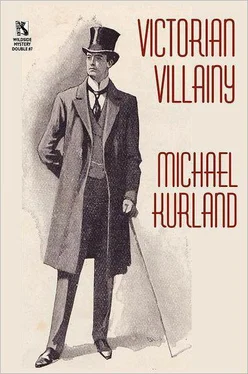
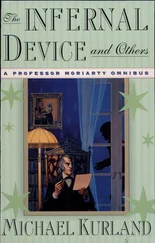

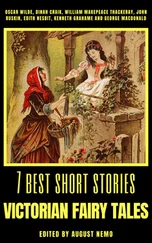




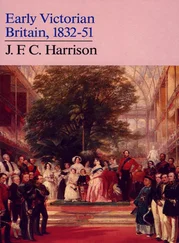
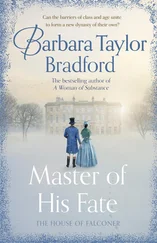
![Brian Thompson - A Monkey Among Crocodiles - The Life, Loves and Lawsuits of Mrs Georgina Weldon – a disastrous Victorian [Text only]](/books/704922/brian-thompson-a-monkey-among-crocodiles-the-life-thumb.webp)
